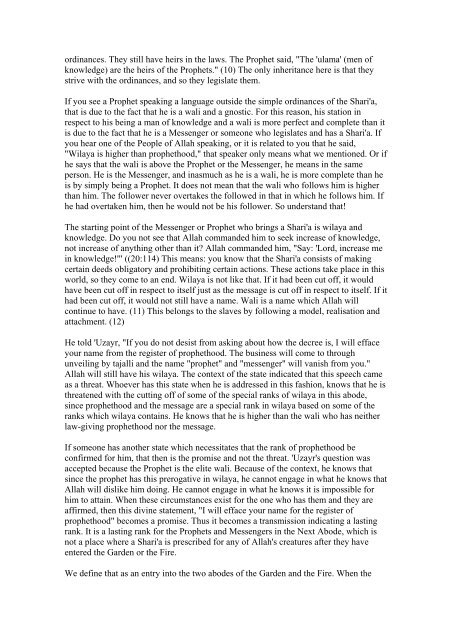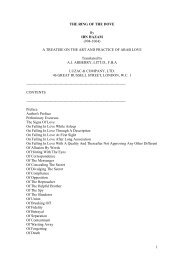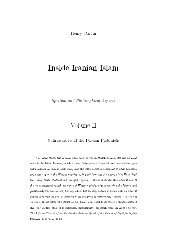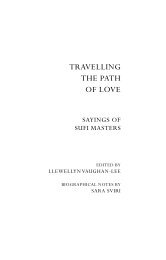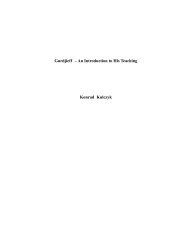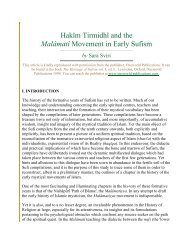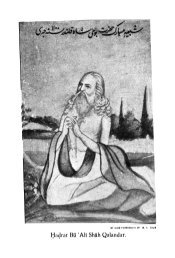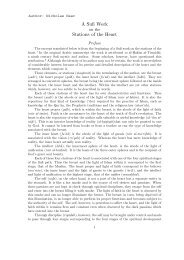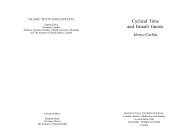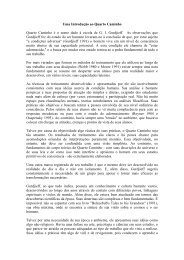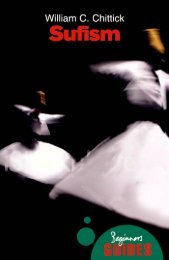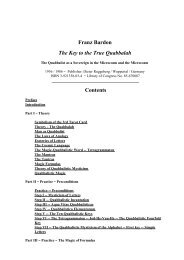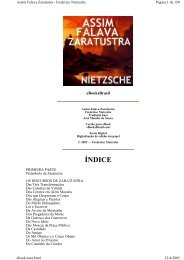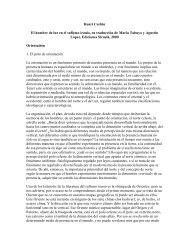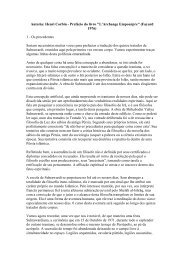Fusus al-Hikam The Seals of Wisdom by Shaykh al ... - ImagoMundi
Fusus al-Hikam The Seals of Wisdom by Shaykh al ... - ImagoMundi
Fusus al-Hikam The Seals of Wisdom by Shaykh al ... - ImagoMundi
Create successful ePaper yourself
Turn your PDF publications into a flip-book with our unique Google optimized e-Paper software.
ordinances. <strong>The</strong>y still have heirs in the laws. <strong>The</strong> Prophet said, "<strong>The</strong> 'ulama' (men <strong>of</strong><br />
knowledge) are the heirs <strong>of</strong> the Prophets." (10) <strong>The</strong> only inheritance here is that they<br />
strive with the ordinances, and so they legislate them.<br />
If you see a Prophet speaking a language outside the simple ordinances <strong>of</strong> the Shari'a,<br />
that is due to the fact that he is a w<strong>al</strong>i and a gnostic. For this reason, his station in<br />
respect to his being a man <strong>of</strong> knowledge and a w<strong>al</strong>i is more perfect and complete than it<br />
is due to the fact that he is a Messenger or someone who legislates and has a Shari'a. If<br />
you hear one <strong>of</strong> the People <strong>of</strong> Allah speaking, or it is related to you that he said,<br />
"Wilaya is higher than prophethood," that speaker only means what we mentioned. Or if<br />
he says that the w<strong>al</strong>i is above the Prophet or the Messenger, he means in the same<br />
person. He is the Messenger, and inasmuch as he is a w<strong>al</strong>i, he is more complete than he<br />
is <strong>by</strong> simply being a Prophet. It does not mean that the w<strong>al</strong>i who follows him is higher<br />
than him. <strong>The</strong> follower never overtakes the followed in that in which he follows him. If<br />
he had overtaken him, then he would not be his follower. So understand that!<br />
<strong>The</strong> starting point <strong>of</strong> the Messenger or Prophet who brings a Shari'a is wilaya and<br />
knowledge. Do you not see that Allah commanded him to seek increase <strong>of</strong> knowledge,<br />
not increase <strong>of</strong> anything other than it? Allah commanded him, "Say: 'Lord, increase me<br />
in knowledge!'" ((20:114) This means: you know that the Shari'a consists <strong>of</strong> making<br />
certain deeds obligatory and prohibiting certain actions. <strong>The</strong>se actions take place in this<br />
world, so they come to an end. Wilaya is not like that. If it had been cut <strong>of</strong>f, it would<br />
have been cut <strong>of</strong>f in respect to itself just as the message is cut <strong>of</strong>f in respect to itself. If it<br />
had been cut <strong>of</strong>f, it would not still have a name. W<strong>al</strong>i is a name which Allah will<br />
continue to have. (11) This belongs to the slaves <strong>by</strong> following a model, re<strong>al</strong>isation and<br />
attachment. (12)<br />
He told 'Uzayr, "If you do not desist from asking about how the decree is, I will efface<br />
your name from the register <strong>of</strong> prophethood. <strong>The</strong> business will come to through<br />
unveiling <strong>by</strong> taj<strong>al</strong>li and the name "prophet" and "messenger" will vanish from you."<br />
Allah will still have his wilaya. <strong>The</strong> context <strong>of</strong> the state indicated that this speech came<br />
as a threat. Whoever has this state when he is addressed in this fashion, knows that he is<br />
threatened with the cutting <strong>of</strong>f <strong>of</strong> some <strong>of</strong> the speci<strong>al</strong> ranks <strong>of</strong> wilaya in this abode,<br />
since prophethood and the message are a speci<strong>al</strong> rank in wilaya based on some <strong>of</strong> the<br />
ranks which wilaya contains. He knows that he is higher than the w<strong>al</strong>i who has neither<br />
law-giving prophethood nor the message.<br />
If someone has another state which necessitates that the rank <strong>of</strong> prophethood be<br />
confirmed for him, that then is the promise and not the threat. 'Uzayr's question was<br />
accepted because the Prophet is the elite w<strong>al</strong>i. Because <strong>of</strong> the context, he knows that<br />
since the prophet has this prerogative in wilaya, he cannot engage in what he knows that<br />
Allah will dislike him doing. He cannot engage in what he knows it is impossible for<br />
him to attain. When these circumstances exist for the one who has them and they are<br />
affirmed, then this divine statement, "I will efface your name for the register <strong>of</strong><br />
prophethood" becomes a promise. Thus it becomes a transmission indicating a lasting<br />
rank. It is a lasting rank for the Prophets and Messengers in the Next Abode, which is<br />
not a place where a Shari'a is prescribed for any <strong>of</strong> Allah's creatures after they have<br />
entered the Garden or the Fire.<br />
We define that as an entry into the two abodes <strong>of</strong> the Garden and the Fire. When the


